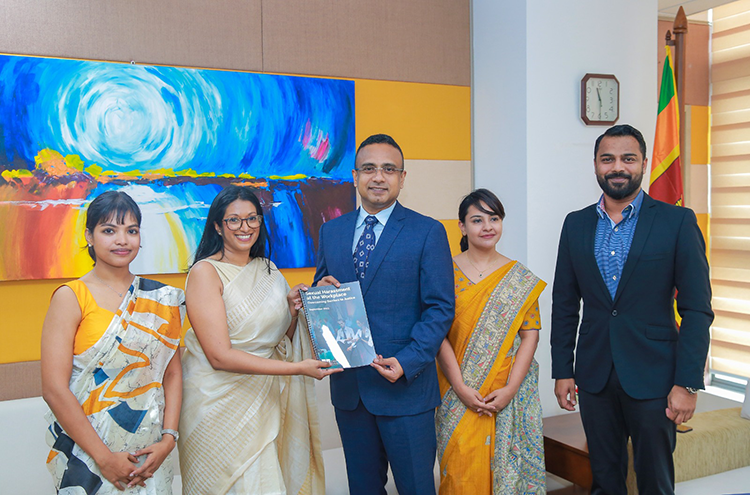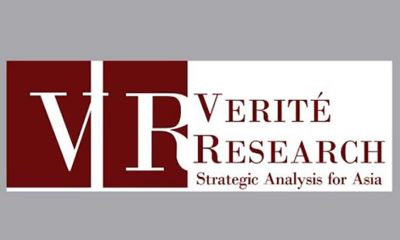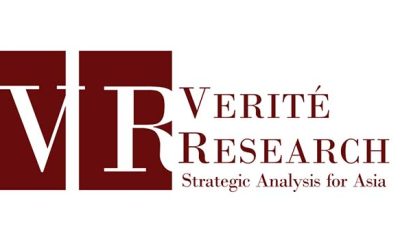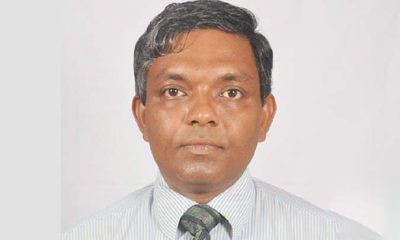News
Reducing workplace sexual harassment: Three barriers and solutions identified

Verité Research’s Law and Governance Division hands over new report to Labour Ministry
Victims of workplace sexual harassment face three main barriers when seeking justice in Sri Lanka, according to a new study conducted by the Law and Governance Division of Verité Research. The report, titled ‘Sexual Harassment at the Workplace: Overcoming Barriers to Justice’, was handed over to the Minister of Labour and Foreign Employment Manusha Nanayakkara on Friday (01 Dec.).
Verité Research discussed the report’s findings with the Minister, emphasising issues in the legal framework and suggesting recommendations to address workplace sexual harassment. The think-tank also recommended enhancing and expanding protections against workplace sexual harassment by incorporating them into the ongoing draft Employment Bill, as part of efforts to expedite legislative reform.
The report draws from the diverse approaches taken by countries such as the Philippines, Peru, Japan, Mexico and Iraq to reduce sexual harassment in the workplace.
It identifies three barriers that need to be overcome:
1. The lack of an adequate legal definition on sexual harassment, despite disparate legislative provisions scattered across different laws.
2. Institutional barriers such as legal delays and high burdens of proof within the criminal justice system.
3. Entrenched cultural barriers and a lack of awareness, which further compounds the plight of victims.
The solutions recommended by the report include:
1. To adopt the internationally recognised definition of ‘violence and harassment’ at the workplace – this includes criminalising voyeurism and providing broader protections against sexual harassment that involves the use of digital or electronic media or images, audio, or videos that have sexual content.
2. To adopt civil legislative changes regarding employer liability for sexual harassment as a complimentary mechanism to the current criminal offense. Employers should be responsible for implementing a minimum set of measures to mitigate and address workplace sexual harassment – this includes internal complaint and inquiry mechanisms, as well as facilitating access to alternative dispute resolution.
3. To enhance education, training and awareness, for law enforcement agencies, in larger workplaces, through school curricula, and for the general public – the report outlines specific approaches that can be adopted for each of these categories.
Not only female victims
The report by Verité Research law and governance division also underscores that workplace sexual harassment extends beyond conventional gender boundaries in Sri Lanka. While women are particularly vulnerable, men as well as individuals with diverse gender identities are also vulnerable. Persons with disabilities, youth, migrant workers, and members of the LGBTQI (Lesbian, Gay, Bisexual, Transgender, Queer, and Intersex) community in Sri Lanka, identified as minority groups, face a higher likelihood of victimisation in this regard.
The full report is available at: www.veriteresearch.org/wp-content/uploads/2023/10/20231031SexualHarassmentat TheWorkPlaceFinal.pdf
News
US sports envoys to Lanka to champion youth development

The U.S. Embassy in Colombo welcomed the U.S. Sports Envoys to Sri Lanka, former National Basketball Association (NBA) and Women’s National Basketball Association (WNBA) players Stephen Howard and Astou Ndiaye, from June 8 through 14.
The Public Diplomacy section of the U.S. Embassy said that it would launch a weeklong basketball program intended to harness the unifying power of sports, made possible through collaboration with Foundation of Goodness and IImpact Hoop Lab.
While in Sri Lanka, Howard and Ndiaye, both retired professional basketball players, will conduct a weeklong program, Hoops for Hope: Bridging Borders through Basketball. The Sports Envoys will lead basketball clinics and exhibition matches and engage in leadership sessions in Colombo and Southern Province for youth aged 14-18 from Northern, Uva, Eastern and Western Provinces, offering skills and leadership training both on and off the court. The U.S. Envoys will also share their expertise with the Sri Lanka Basketball Federation, national coaches, and players, furthering the development of basketball in the country. Beyond the clinics, they will collaborate with Sri Lankan schoolchildren to take part in a community service project in the Colombo area.
“We are so proud to welcome Stephen and Astou as our Sports Envoys to Sri Lanka, to build on the strong people-to-people connections between the United States and Sri Lanka,” said U.S. Ambassador Julie Chung. “The lessons that will be shared by our Sports Envoys – communication, teamwork, resilience, inclusion, and conflict resolution – are essential for leadership development, community building, equality, and peace. The U.S. Sports Envoy program is a testament to our belief that sports can be a powerful tool in promoting peace and unity.”
News
Rahuman questions sudden cancellation of leave of CEB employees

SJB Colombo District MP Mujibur Rahuman in parliament demanded to know from the government the reasons for CEB suspending the leave of all its employees until further notice from Thursday.
MP Rahuman said that the CEB has got an acting General Manager anew and the latter yesterday morning issued a circular suspending leave of all CEB employees with immediate effect until further notice.
“We demand that Minister Kanchana Wijesekera should explain this to the House. This circular was issued while this debate on the new Electricity Amendment Bill was pending. There are many who oppose this Bill. The Minister must tell parliament the reason for the urge to cancel the leave of CEB employees,” the MP said.However, Speaker Mahinda Yapa Abeywardena prevented Minister Wijesekera responding to the query and said that the matter raised by MP Rahuman was not relevant.
News
CIPM successfully concludes 8th Annual Symposium

The Chartered Institute of Personnel Management (CIPM) successfully concluded the 8th Annual CIPM Symposium, which took place on 31st May 2024. Themed “Nurturing the Human Element—Redefining HRM in a Rapidly Changing World,” the symposium underscored the pivotal role of human resource management (HRM) in today’s dynamic global landscape. Since its inception in 1959, CIPM has been dedicated to advancing the HR profession through education, professional development, and advocacy, solidifying its position as Sri Lanka’s leading professional body for HRM.
Ken Vijayakumar, the President of the CIPM, graced the occasion as the chief guest. The symposium commenced with the welcome address by the Chairperson, Prof. Arosha Adikaram, followed by the Web Launch of the Symposium Proceedings and Abstract Book by the CIPM President. The event featured distinguished addresses, including a speech by Chief Guest Ken Vijayakumar, President of CIPM, and an address by Guest of Honor Shakthi Ranatunga, Chief Operating Officer of MAS Holdings Pvt. Ltd., Sri Lanka.
The symposium also featured an inspiring keynote address by Prof. Mario Fernando, Professor of Management and Director of the Centre for Cross Cultural Management (CCCM) at the University of Wollongong, Australia.
Vote of Thanks of the inauguration session was delivered by Dr. Dillanjani Weeratunga, Symposium Co-chair.
The symposium served as a comprehensive platform for researchers to present their findings across a wide range of critical topics in HRM. These included Cultural Diversity and Inclusion, Talent Development and Retention, Ethical Leadership and Corporate Social Responsibility, Adapting to Technological Advancements, Mental Health and Well-being at Work, Global Workforce Challenges, Employee Empowerment, and Reskilling and Upskilling.
The plenary session was led by Prof. Wasantha Rajapakse. Certificates were awarded to the best paper presenters during the valedictory session, followed by a vote of thanks delivered by Kamani Perera, Manager of Research and Development.
The annual symposium of CIPM was a truly inclusive event, attracting a diverse audience that spanned undergraduates, graduates, working professionals, research scholars and lecturers. This widespread interest highlights the symposium’s significance in the field of HRM, offering a unique opportunity for everyone to network and learn from scholarly brains.The CIPM International Research Symposium was sponsored by Hambantota International Port, Sri Lanka Institute of Information Technology (SLIIT), E B Creasy & Co. PLC, and Print Xcel Company.
























